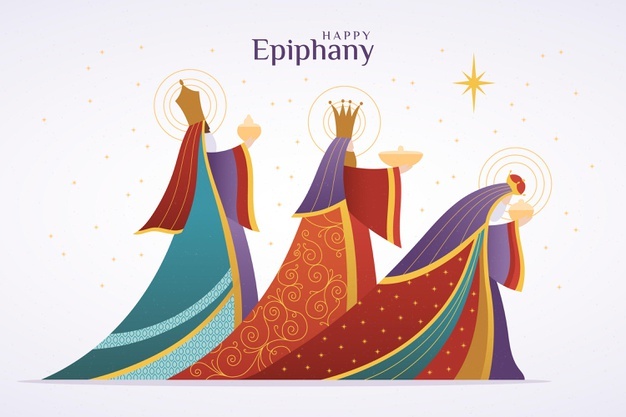Epiphany
This solemnity of the Epiphany has for so long been associated with the image of “Three Kings” that it’s easy to forget that Matthew, who is the only evangelist who relates this particular story, nowhere mentions either the number of visitors or their kingly rank. The number three seems to have been inferred from the three gifts—gold, frankincense, and myrrh. Tradition holds that, guided by a miraculous light of a star, the three kings or magi arrived in Bethlehem where they paid homage to the Infant Jesus. Their names, Balthasar, Melchior and Caspar are derived from their home countries named in the Responsorial Psalm: Arabia, Persia, and India. They are usually shown to be of the three races: white, brown and black to stress that the Manifestation of the Lord was being made to all peoples.
Greek and Russian traditions hold there were twelve Magi because as they argue there were twelve legions of angels, twelve apostles, and twelve tribes of Israel. A folksy story arises from the Holy Land about a Bethlehem widow named Babushka who put finishing touches on her housework ahead or trailing after the three mysterious visitors who spoke of a guiding star. Her story holds a moral for us: never let the important interfere with the essential.
Kindred beliefs, stories and customs come from all over the world. In Kerala, India, Epiphany is a holyday of great importance. The annual celebration begins early in the day at the cathedral with much congregational participation.
With our closeness to Tarpon Springs, we are well aware of the Greek tradition of young men diving into the bayou (no matter how cold the water is) in hopes of retrieving the Cross that will bring them a year of blessings.
In Spanish-speaking countries it is often the tradition to observe Three Kings Day, first at church, then it’s time for partying and exchanging gifts. For some, reminiscent perhaps of the St. Nicholas Day customs, a trail of hay is left for the Kings’ camels to lure them to homes to leave a gift.
One of the customs in some places in Germany is for carolers to go house-to-house. (You’ll recognize this practice in our Epiphany house blessing. I suspect that our Benedictines ancestors must have brought it with them when they came to the U.S. in 1852 .. from PA to our foundation in 1889). The carolers paint, above or near the doorway, “20+C+M+B+21” which are the first letters, some say, of the three kings Caspar, Melchior and Balthazar. Others say it is Latin for “Christ bless this house.”
In England and some former British colonies, according to an old custom, the “downstairs folk” celebrate Boxing Day on December 26, when their manor house employers gifted them with their unwanted gifts. (Today we’d say they recycle the gifts.) In some countries – most notably Italy and Russia – there is a long-held shared tradition of the kindly old witch who makes her annual visit bringing presents by climbing down the chimney on Epiphany eve.
In the Philippines, which is composed of 2000 inhabited islands, Epiphany is a mix of celebrations honoring the elders and children and the wearing of King’s Hats. And you know the custom of the King’s Cake.
But why would we be interested in any of this or in any of the Epiphany or Twelfth Night customs that have evolved over the years. For one, we are a nation, and a community, from a variety of backgrounds. As Pope Francis said to us in his Apostolic Letter on Consecrated Life: “Journeying together always brings enrichment and can open new paths to relationships between peoples and cultures.” Our prayer intention this week is that the dawning of this new year may bring with it the gifts of a warm welcome, peace, financial security, good health and worthy companionship for migrants, immigrants, displaced persons and all for whom we have promised to pray – and let’s not overlook each other.
In closing, I want to share with you a little story I was reminded of recently. It was first published in 1977 – Sharon’s Christmas Prayer by John Shea (To our readers: Take a breath, read the poem, if you will, aloud – with a child’s exuberance.)
“She was five, sure of the facts, and recited them with slow solemnity convinced every word was revelation.
She said they were so poor they had only peanut butter and jelly sandwiches to eat and they went a long way from home without getting lost. The lady rode a donkey, the man walked, and the baby was inside the lady.
They had to stay in a stable with an ox and an ass (hee-hee)
but the Three Rich Men found them because a star lited the roof.
Shepherds came and you could pet the sheep but not feed them.
Then the baby was borned. And do you know who he was?
Her quarter eyes inflated to silver dollars, The baby was God.
And she jumped in the air whirled round, dove into the sofa and buried her head under the cushion which is the only proper response to the Good News of the Incarnation.
Continue Reading

